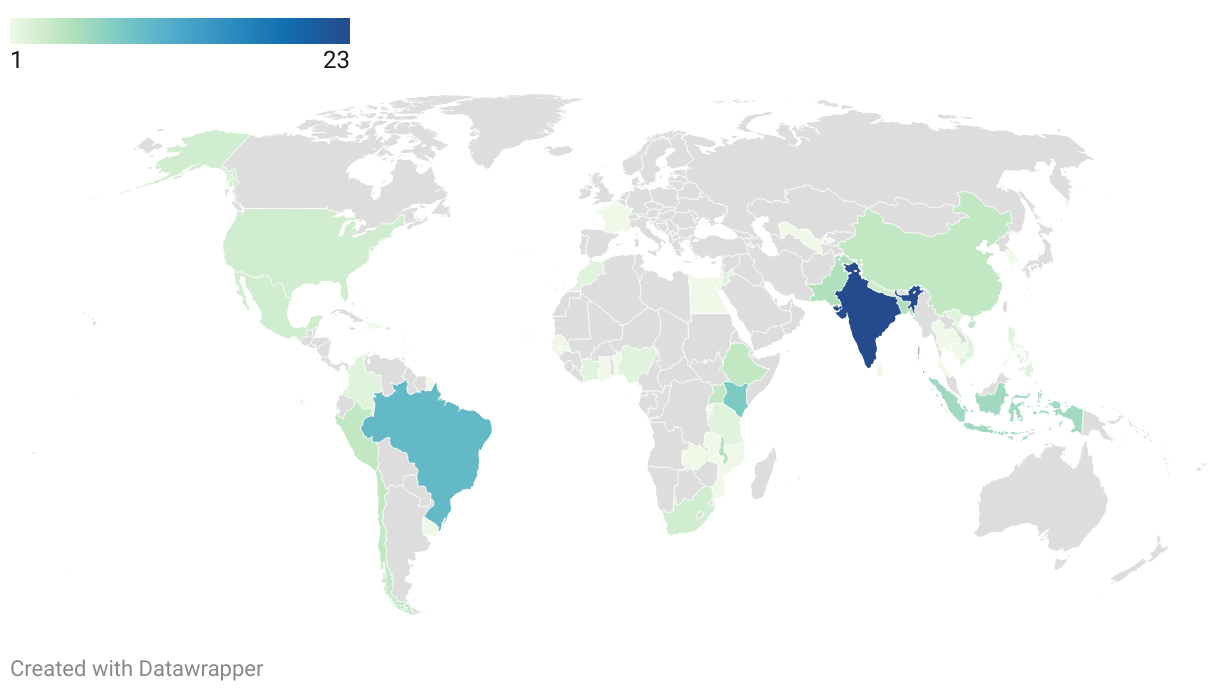Hi all,
When I moved to the UK, having grown up in Hong Kong, I wasn’t expect regional variations in culture and politics to be anywhere as stark as I’ve discovered them to be. And having heard from the sole Scot in my school what a Glasgow kiss (a headbutt, apparently) and a Glasgow salad (chips, apparently) were, I really wasn’t expecting it to be one of my favourite places in the world when I first visited on a trip to Abercrombie House, home of a large chunk of what was then DFID, especially given that I have vocal and strong views about both the cold and rainy weather (there have been about 35 days of summer in the most recent decade I’ve spent in the UK, so perhaps the bar was simply too low). Anyway, it’s always nice to see an old friend in the news for a good reason, and Glasgow is apparently still brilliant, protecting asylum seekers and migrants in their communities, and peaceful as you like. I can’t wait till travel is normal again. My wife may be agitating for a trip to Greece, but I think our Northern neighbours have made a pretty good claim for our tourism spending…
- Human movement and migration is also, of course, the subject of Episode 3 of everyone’s favourite economics podcast, Paper Round. In Living for the City, Matt and I discuss Travis Baseler’s fascinating paper about internal migration in Kenya, in which he documents that migrants who move to the city in Kenya under-report their earnings to avoid having to remit too much money back home (transcript). What might seem like a little white lie to them winds up having a large impact on the beliefs of rural Kenyans over what sort of returns there are to working in the city, resulting in artificially depressed levels of migration. Matt and I talk through the three stages then paper goes through to prove all this, linking the discussion to The Falcon and the Winter Soldier (you can hear Matt’s eyes light up as he talks about Sebastian Stan, and who can blame him), Tusker’s slogan (so very nearly badala ya kazi, and whether our social networks are really looking out for our best interests. Listen, review, share, everyone!
- Speaking of Paper Round, way back in Episode 1, on poverty traps, we speculated whether one of the things trapping people in poverty was the fact that some investments are ‘lumpy’ – you can’t buy shares of a cow, certainly not as an impoverished farmer in the middle of rural Tanzania. Simon Quinn and co-authors have a really cool paper out which shows that removing the ‘micro’ from microcredit can have really large welfare effects, precisely because some valuable investments that the poor would greatly benefit from making are too large to save bit by bit for.
- “The right answer to any policy question in economics is, ‘It depends.’ We need economic analysis and evidence to fill out the details of what the desired outcome depends upon. The keywords of a truly useful economics are contingency, contextuality, and non-universality.” The first time you read these words from Dani Rodrik, arguing for a new way of talking about economics, rather than a new way of doing economics, they seem wise and important. But I have some doubts. Yes, nothing is true everywhere and always (as a wise man’s twitter bio says “I think you’ll find it’s a little more complicated than that”). But some things are true in many places; and once we understand a causal mechanism (an outcome that can never arise from solely empirical research; theory is always necessary to think about the world, because no-one’s brain is big enough to truly think about the world as it really is, rather than some simplified version of it) we can be rather more strident in our assertions. And I wonder if part of the problem of economics is that we have too few great debates about the truth of a topic, too easily settling for ‘it depends’. Perhaps we’re saying the same thing in different ways.
- Heather Sarsons and Guo Xu (rising stars co-author together) have a new paper documenting three kinds of confidence gap between men and women. What’s remarkable is that their sample is economists working in top US universities, a population of some of the most confident and strident people on the planet. Anyway, the gap seems to be driven by women being more cautious in fields outside their area of expertise. These papers should really be reframed to discuss the problem of overconfidence among men, I say, confidently, about a subject outside my expertise.
- Speaking of overconfidence, I missed this from the FT: when asked, most people are very confident they know what the most important actions they can take to combat climate change are; asked to select them, they systematically pick marginal stuff that doesn’t make much difference. We need a word for displaying irrational confidence on the basis of extremely shaky knowledge; Trumping has already been taken, any alternatives?
- From our department of Development Impact is a Public Good to Treasure: Berk Ozler, John Loeser and Patrick Premand have a good, clear and simple summary of the state of our knowledge on cash transfers, in less than a five minute read.
- Finally, I’ve missed many things during the pandemic. I’ve missed traveling; dim sum in noisy, crowded restaurants; tiny poky bookstores with no ventilation and far too many books for their shelves; and going to the cinema to see the latest bit of Marvel ridiculousness. But one activity stands out for its sheer covid-unsafeness and fun: karaoke, the art of singing loudly while drunk with 20 people in a tiny room has basically been wiped out by the pandemic. Luckily Tony Chow at FiveThirtyEight has been feeling the lack, too and produced this wonderful video of a year without karaoke. And FiveThirtyEight are usually known for their beautiful data visualisations, but sometimes ugly data is wonderful too, and I loved this thread of terrible dataviz. And to wash that sour taste out, here’s one of my all time favourites – the graph title says it all: Leonardo DiCaprio refuses to date a woman over 25.
Have a great weekend, everyone (except you Leo, that’s disgraceful)
R
Disclaimer
CGD blog posts reflect the views of the authors, drawing on prior research and experience in their areas of expertise. CGD is a nonpartisan, independent organization and does not take institutional positions.





